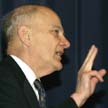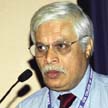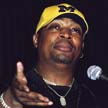| All A's for the College of Education | The fabled march to Fort Hood | Recognition of contributors |
 |
||
| Home Forethought Campus Buzz Feature Stories Re:Search The Score Alum News Yesteryear | ||
 Advances in information technology will fundamentally change the nature of universities, National Academy of Engineering President William Wulf says. But he’s not sure what those changes will entail.
Advances in information technology will fundamentally change the nature of universities, National Academy of Engineering President William Wulf says. But he’s not sure what those changes will entail.
In an October speech in the Rosebud Theatre, Wulf detailed a history of failed predictions in the IT field, like Bill Gates’ alleged assertion in 1981 that people would never need more than 640 kilobytes of memory in their computers. Prognosticators have erred, Wulf said, because they’ve only considered quantitative changes.
“Things don’t just stay the same and get better,” he said. “They change qualitatively.”
Wulf believes that books as they exist today have no future. Their contents are static, you can’t click on them, and they can’t update themselves.
“The book of the future will not be able to be reduced to paper,” he said.
He also contends that information technology will have a much greater impact on humanistic scholarship than scientific scholarship and that students may one day attend virtual universities.
The presentation was part of the third annual Technology Fair sponsored by the Provost’s Office, Honors College, UTA Libraries, Center for Distance Education and Office of Information Technology.
 Sprinkling snippets of dark humor with forensic pathology, Nizam Peerwani informed and entertained a Rosebud Theatre crowd at the third Forensic Science Educational Conference in October.
Sprinkling snippets of dark humor with forensic pathology, Nizam Peerwani informed and entertained a Rosebud Theatre crowd at the third Forensic Science Educational Conference in October.
“If you’re very good today and don’t ask any hard questions, I’ll give you a coupon for a free autopsy,” quipped the chief medical examiner for Tarrant, Parker and Denton counties.
Dr. Peerwani, who gained national attention in 1993 for his role in identifying bodies from the Branch Davidian fire near Waco, said a forensic pathologist’s most important job is analyzing the evidence and reaching a conclusion that will hold up in court. This requires a systems approach whereby a competent person secures, gathers and evaluates evidence scientifically.
Good communication skills and a strong psyche are imperative, he said.
“If you possess all the knowledge but can’t present it, then you’re absolutely useless in this field. Psychologically you must be strong enough to accept, day in and day out, many horrendous crimes against humanity. Believe it or not, a medical examiner never really gets used to that. It takes a toll each day.”
The UTA College of Science, the American Academy of Forensic Sciences and Court TV sponsored the conference.
 Education, race, equality and technology in the music industry all got a little air play during rap artist Chuck D’s presentation to several hundred people in the Bluebonnet Ballroom in September.
Education, race, equality and technology in the music industry all got a little air play during rap artist Chuck D’s presentation to several hundred people in the Bluebonnet Ballroom in September.
“There is no such thing as a college thug,” he said, urging students to emphasize education instead of the gangster lifestyle often glamorized in hip-hop music. He said that too often young blacks value street credibility over true knowledge.
“This is your world, but it won’t be your world if you’re not mentally prepared for it,” he said.
Chuck D, whom filmmaker Spike Lee calls one of the most politically and socially conscious artists of any generation, helped pioneer political rap music in the 1980s with his group Public Enemy.
The talk was sponsored by EX.C.E.L. Campus Activities.
| Archives
| Alumni Association |
Giving to UTA | UTA
Home Copyright © 2004 UTA Magazine. All rights reserved. |